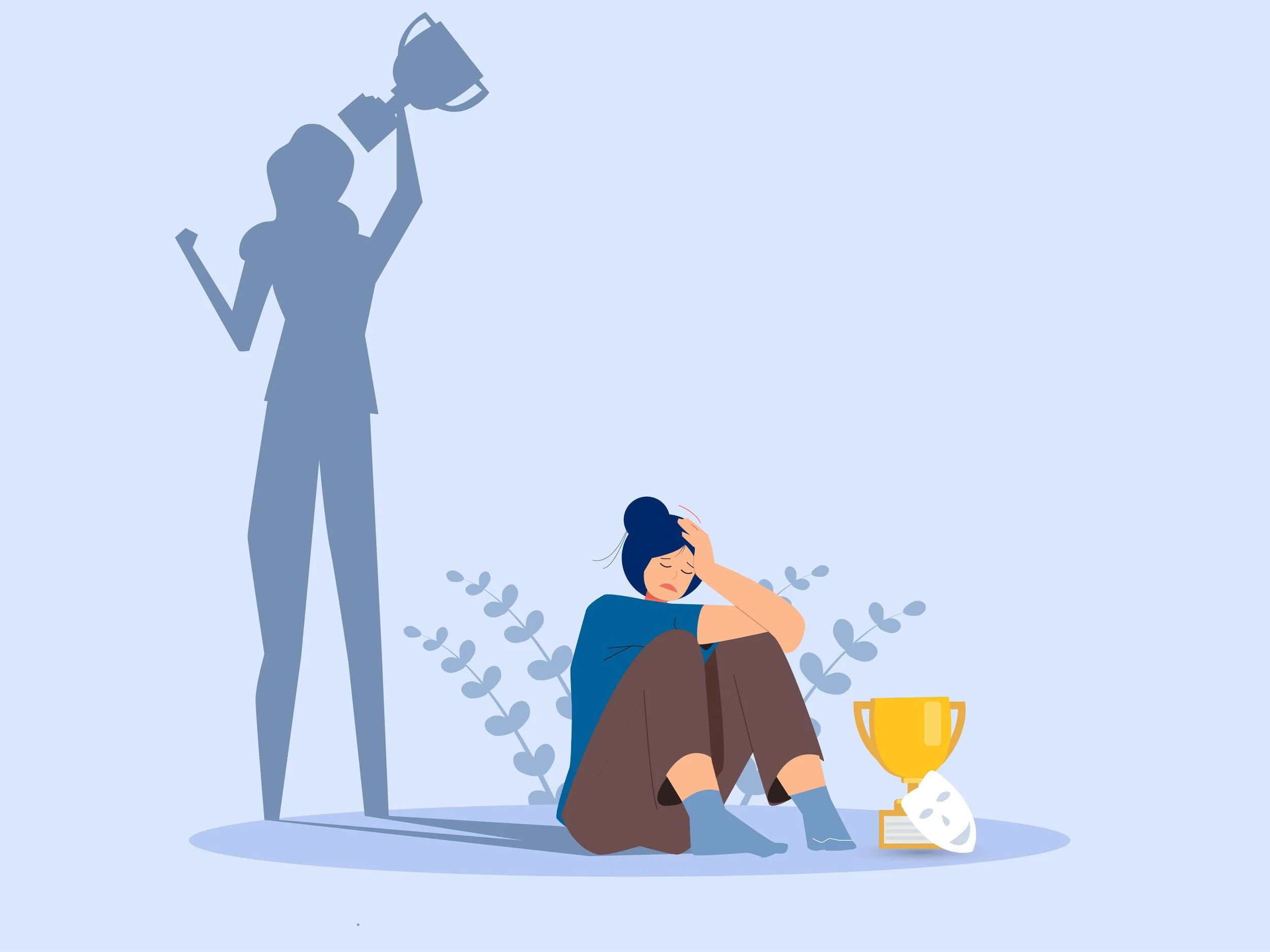Living with Imposter Syndrome: How I Learned to See My Worth
I’ve done a lot in my 25 years of life.
I say that as an affirmation to myself, not as a brag to you.
I completed my undergraduate degree and my master’s program right in the middle of the COVID-19 pandemic. That meant many of my accomplishments—awards, recognitions, and even graduations—happened in isolation. They were experienced over Zoom, with only my roommates and my quarantine kitten by my side.
I remember a specific day during my senior year of college, just before graduation, when these feelings were coming to a head. I was convinced my peers had done more, mattered more, and contributed more than I had. As if the universe wanted to test me, I received an award in the mail from my university’s health center that same day—recognizing my contributions during my junior and senior years as a Peer Educator and Peer Leader.
There was no ceremony. No photo op. No public recognition. Just the physical trophy in my hand. Instead of feeling proud, I felt like a fraud. The award felt hollow, undeserved, and forgotten, reinforcing the idea that maybe I hadn’t really earned it.
Fast forward to now: I’m nearly two years into my professional career. And I've had to introduce myself a lot in that time. I often find myself mentioning my accomplishments—being a full-time grad student with a 3.9 GPA, working nearly full-time at a drive-thru coffee chain, developing on-campus programs and having multiple internships—but I say it all as if it were just... expected. Like it was the bare minimum. I downplay the fact that I took graduate-level courses during my senior year of undergrad. I brush over how I still completed my MPH by age 23. I act like taking longer than most of my cohort to finish somehow lessens its value.
But it was an accomplishment. A big one.
It wasn’t until a current teammate looked at me, genuinely surprised, and said, “Wait you did all that before even starting your career? I’m so proud of you,” that I realized something important. I wasn’t acting proud of myself. I could recite my résumé like a script, but I wasn’t allowing myself to feel the pride, effort, or heart behind those achievements.
That’s imposter syndrome.
It’s the feeling that you’ve somehow fooled everyone into believing you're more capable than you really are. That you're undeserving. That your success isn’t real. For me, it was believing that everything I had done wasn’t as important, impressive, or meaningful as what others were doing—and it began to affect my current career. If I hadn’t earned my previous achievements, how could I possibly deserve the role I have now?
And I know I’m not alone.
Imposter syndrome is one of the most common mental health challenges professionals face—especially young professionals. A 2019 review published in The Journal of General Internal Medicine found that up to 82% of people report experiencing imposter syndrome at some point in their lives.
For me, it was amplified by missing out on the “normal” end-of-college experiences. Social media made it worse. LinkedIn, Facebook, Instagram—they all showed me a highlight reel of other people’s successes. And even if I hadn’t done the exact same things as my peers, I was juggling a lot: an internship, a demanding job, graduate-level coursework, a relationship, a social life, my own wellbeing, and a cat. My life didn’t need to look like anyone else’s. I didn’t need to prove my worth through productivity. So why was I comparing myself—or more specifically, comparing my value—to everyone else?
Imposter syndrome is the conflict between how we see ourselves and how we think others see us. It convinces you that you don’t belong. That you’re one mistake away from being exposed as a fraud. It creates a cycle: each new accomplishment feels like another mask you’re putting on instead of evidence that you’ve grown and succeeded.
It can show up in many ways—perfectionism, fear of asking for help, overworking, or feeling the need to excel in everything, even when it’s outside your expertise. But at its core, imposter syndrome is rooted in self-doubt, uncertainty, and a sense of unworthiness.
So how do we break the cycle?
The first step is awareness. Acknowledge your feelings. Recognize when those doubts show up—and question them.
Treat yourself with the same kindness and compassion you’d give a friend. We’re often our harshest critics, but that judgment only feeds the cycle. By giving ourselves grace, we begin to challenge those internal narratives.
It also helps to build community. Having a support system of trusted friends, mentors, or colleagues can remind you that you’re not alone. That your feelings, while valid, are not facts. And that everyone, even the people you admire, has questioned their worth at some point.
And maybe most importantly: stop comparing. Comparison is the thief of joy. It strips away your ability to appreciate your own journey. Your life isn’t meant to follow anyone else’s timeline. Your accomplishments are valid because you achieved them, not because they match someone else's checklist.
Let me be clear: I still wrestle with imposter syndrome almost daily. I haven’t even begun to unpack how it shows up in my current career. Like many mental health challenges, it doesn’t just vanish. But I remind myself often:
I don’t need to be productive every waking hour.
I’ve earned the accomplishments I’ve achieved.
I am worthy, even without the résumé.
And my value isn’t measured by what I produce—but by who I am.
I’ve done a lot in my 25 years of life.
And even if I hadn’t, what matters is that I am me. Truly and authentically. And that, on its own, is more than enough.

